|
|
|
Sort Order |
|
|
|
Items / Page
|
|
|
|
|
|
|
| Srl | Item |
| 1 |
ID:
151797
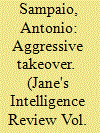

|
|
|
| 2 |
ID:
152749
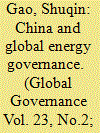

|
|
|
|
|
| Summary/Abstract |
China has been pursuing a risk averse counterweight energy strategy, cultivating strategic energy allies and diversifying its energy sources, generating a power shift of energy distribution from international oil companies to national oil companies. China's neomercantilism and NOCs suggest neither integration into the US-led international energy regime nor confrontation with the Organisation for Economic Co-operation and Development–centered global energy governance. Instead, China is working toward creating a China-led alternative competitive regime. The prospect is therefore the emergence of a more fragmented and multilayered global energy governance.
|
|
|
|
|
|
|
|
|
|
|
|
|
|
|
|
| 3 |
ID:
163754
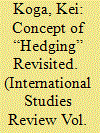

|
|
|
|
|
| Summary/Abstract |
This article argues that the concept of “hedging” should be understood in the context of the “balancing-bandwagoning” spectrum within the “balance of power” theory, in which hedging is located between balancing and bandwagoning as the state's third strategic choice. Although polarity— unipolar, bipolar, and multipolar—largely determines the likelihood of hedging behavior, during a period of power shift, strategic uncertainty emerges. States, particularly secondary powers, attempt to calculate the risk of balancing, bandwagoning, and hedging, adopting an optimal strategy. To identify states’ strategic behavior, it is important to first examine their economic and military capabilities, and if these indicators are not decisive enough to identify balancing, bandwagoning, or hedging behavior, diplomatic factors should be taken into account, although those are a relatively weaker indicator.
The use of this conceptual framework reveals that Japan's foreign policy behavior has not involved “hedging” vis-à-vis China; instead, Japan's behavior is consistently associated with “balancing” against the risks of China's rise. In addition, while Japan's behavior vis-à-vis the United States is considered to be bandwagoning, Japan made political efforts to strengthen its own military capabilities—internal balancing—which began in the 2010s when Japan relaxed its political constraints on use of its military. This behavior also aimed both to illustrate Japan's efforts related to alliance burden-sharing and to enhance its external balancing with the United States. Yet, the periods from 1997 to 2005 and from 2010 on represent an aberration because Japan engaged one type of hedging—security hedging—vis-à-vis the risk of US commitment reduction to East Asia. In this sense, while concurring with the realists’ argument that Japan's current behavior is characterized as balancing, the argument differs from that of realists who believe that Japan's policy shift to balancing toward China only began with China's rise in the late 2000s or 2010s.
|
|
|
|
|
|
|
|
|
|
|
|
|
|
|
|
| 4 |
ID:
133964
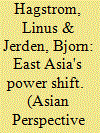

|
|
|
|
|
| Publication |
2014.
|
| Summary/Abstract |
The widespread debate on an East Asian power shift is generally based on the crude notion that power and capability are interchangeable. We critique this view and offer the alternative that power is the capacity of actors and discourses to produce effects- what we call relational and productive power, respectively. We also engage in a reflexive exercise by addressing the productive power of the power-shift debate itself, and emphasize the danger that this debate might enable the kind of realpolitik that it forebodes.
|
|
|
|
|
|
|
|
|
|
|
|
|
|
|
|
| 5 |
ID:
133967
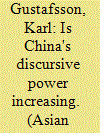

|
|
|
|
|
| Publication |
2014.
|
| Summary/Abstract |
The idea that China's rise, and more specifically its increased material capabilities, are about to produce a power shift in East Asia raises the question whether the Chinese government's ability to produce effects through discursive power has also increased. The government's use of discourses about China's war against Japan is a conspicuous example of attempts to exercise discursive power. Has China's ability to use the past for political purposes increased as its material capabilities have grown? To answer this question, I theorize on the use of discourses about the past on three levels-domestic, bilateral, and international. My analysis demonstrates that notwithstanding its increased material capabilities, the Chinese government's discursive power has actually decreased.
|
|
|
|
|
|
|
|
|
|
|
|
|
|
|
|
| 6 |
ID:
181659
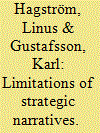

|
|
|
|
|
| Summary/Abstract |
Recent research has explored how the Sino-American narrative struggle around COVID-19 might affect power shift dynamics and world order. An underlying assumption is that states craft strategic narratives in attempts to gain international support for their understandings of reality. This article evaluates such claims taking a mixed-methods approach. It analyzes American and Chinese strategic narratives about the pandemic, and their global diffusion and resonance in regional states that are important to the U.S.-led world order: Australia, India, South Korea, Turkey, and the United Kingdom. While the article confirms that strategic narratives remain a highly popular policy instrument, it argues that their efficacy appears limited. Overall, the five states in question either ignored the Sino-American narrative power battle by disseminating their own strategic narratives, or they engaged in “narrative hedging.” Moreover, even China’s narrative entrepreneurship was enabled and constrained by pre-existing master narratives integral to the current U.S.-led world order.
|
|
|
|
|
|
|
|
|
|
|
|
|
|
|
|
| 7 |
ID:
130783
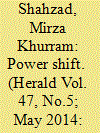

|
|
|
| 8 |
ID:
131007
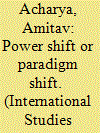

|
|
|
|
|
| Publication |
2014.
|
| Summary/Abstract |
This essay proposes a new theoretical framework for analyzing the rise of China and its impact on Asian security order. While the rise of China is reshaping Asia's military balance, the region has also witnessed equally important and longer-term changes, especially economic interdependence, multilateral institutions and domestic politics. The implications of these changes are not fully accounted for by the different types of security orders proposed by analysts to describe the implications of China's rise, such as anarchy, hierarchy, hegemony, concert, and community. This essay presents an alternative conceptualization of Asian security order, termed consociational security order (CSO) that draws from different theoretical lenses: defensive realism, institutionalism, and especially consociational theory in comparative politics. Specifying the conditions that make a CSO stable or unstable, the essay then examines the extent to which these conditions can be found in Asia today. Aside from offering a distinctive framework for analyzing China's rise, the CSO framework also offers an analytic device for policymakers and analysts in judging trends and directions in Asian security.
|
|
|
|
|
|
|
|
|
|
|
|
|
|
|
|
| 9 |
ID:
119244
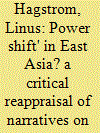

|
|
|
|
|
| Publication |
2012.
|
| Summary/Abstract |
Great symbolic value has been invested in the incident between Japan and the People's Republic of China (PRC, China) that began in waters surrounding the disputed Diaoyu/Senkaku Islands on September 7, 2010.1 Although several distinct narratives on the incident have appeared, the leading one essentially interprets its process and fallout as (further) evidence of an ongoing 'power shift' in East Asia, or explains it as a consequence of such a 'power shift'.2 In this instance, Chinese 'aggressiveness' or 'pressure', and Japanese 'weakness' or 'defeat' are viewed respectively as reflections of 'China's rise' and 'Japan's decline'.
|
|
|
|
|
|
|
|
|
|
|
|
|
|
|
|
| 10 |
ID:
119269
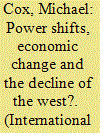

|
|
|
|
|
| Publication |
2012.
|
| Summary/Abstract |
It has become the new truth of the early twenty-first century that the Western world we have known is fast losing its pre-eminence to be replaced by a new international system shaped either by the so-called BRICs comprising Brazil, Russia, India and China, the 'rest', or more popularly by that very broadly defined geographical entity known as Asia. This at least is how many economists, historians and students of world politics are now viewing the future of the larger international system. This essay does not dispute some self-evident economic facts. Nor does it assume that the world will look the same in 50 years time as it does now. It does, however, question the idea that there is an irresistible 'power shift' in the making and that the West and the United States are in steep decline. Specifically, it makes a number of critical arguments concerning the new narrative. First, it suggests that this story, by reasonably focusing on what is obviously changing in the world, unfortunately ignores what is not; as a result, it underestimates what might loosely be termed the continued structural advantages still enjoyed by the United States and its major Western allies. Second, while it is true that many new states are assuming a bigger role in the world economy, their rise needs to be looked at more carefully than it has been so far; indeed, when such an examination is undertaken, it becomes increasingly clear that the rise of others - including China - is still hemmed in by several obstacles, internal as well as external. Third, though the Asian region, and China as part of it, is assuming an ever more important role in the wider world economy, this development should not be seen as marking the beginning of a new Asian Century. This now popular idea is not only conceptually problematic, it inevitably leads to an underestimation of other key areas in the world including incidentally the Transatlantic region. Finally I suggest that if the dubious idea of a power shift is taken to be true, this could very easily lead to greater international insecurity and conflict. Understanding the modern world better than many seem to be doing right now is therefore not only intellectually important; it is strategically necessary too.
|
|
|
|
|
|
|
|
|
|
|
|
|
|
|
|
| 11 |
ID:
168281
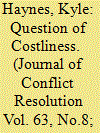

|
|
|
|
|
| Summary/Abstract |
This article examines how interstate signaling processes operate under multiple dimensions of uncertainty. The existing signaling literature largely assumes that states communicate and infer one another’s intentions in a simplified context where they are only uncertain about one component of the other’s preferences. Relaxing this unrealistic assumption, I develop a model of interstate reassurance in which the receiver is uncertain of both the compatibility of the sender’s goals and its time horizons. If a receiving state is unsure of the sending state’s time horizons, it is more difficult to determine the costliness of a given signal, and thus how credible it is as an indicator of the sender’s preferences. I show that under certain conditions, shorter time horizons lead to more credible signaling as states become less willing to incur the short-term costs of misrepresentation. Under other conditions, however, shortened time horizons can incentivize hedging behavior, thus undermining a benign state’s ability to credibly signal its intentions. Finally, the model reveals that multidimensional uncertainty can actually facilitate cooperation across a wider range of conditions than one-dimensional uncertainty. I present two brief case illustrations and discuss the model’s implications for contemporary US–China relations.
|
|
|
|
|
|
|
|
|
|
|
|
|
|
|
|
| 12 |
ID:
133966
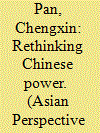

|
|
|
|
|
| Publication |
2014.
|
| Summary/Abstract |
A growing body of literature has focused on an alleged "power shift" from the United States to China (and from the West to the East more generally). For all its complexities and nuances, much of this power-shift literature continues to unreflectively hold onto a conventional way of conceptualizing power as a type of quantitatively measurable and zero-sum property possessed by the state. Without critically engaging with the conceptual question of what power means, however, the power-shift debate is both inadequate and misleading. Drawing on some alternative ways of conceptualizing power, I aim to illustrate the contingent and socially constructed nature of "Chinese" economic power and, in doing so, problematize the widely held view of a US-China power shift. I contend that insofar as power is socially constructed, how it is conceptualized matters for international relations. The need to rethink power is at the core of building a new type of major power relationship.
|
|
|
|
|
|
|
|
|
|
|
|
|
|
|
|
| 13 |
ID:
140160
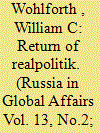

|
|
|
|
|
| Summary/Abstract |
Anarrative has taken hold around the world that might be titled "the return of Realpolitik." From the happy days of globalization in the 1990s to the frenzied war on terror and associated counterinsurgency struggles of the first decade of the 2000s, the argument goes, great powers and geopolitics are back. Walter Russell Mead put this conventional wisdom well: "Whether it is Russian forces seizing Crimea, China making aggressive claims in its coastal waters, Japan responding with an increasingly assertive strategy of its own, or Iran trying to use its alliances with Syria and Hezbollah to dominate the Middle East, old-fashioned power plays are back in international relations."
|
|
|
|
|
|
|
|
|
|
|
|
|
|
|
|
| 14 |
ID:
133965
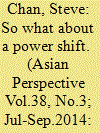

|
|
|
|
|
| Publication |
2014.
|
| Summary/Abstract |
In this article I consider the general idea of power shifts, with specific reference to the discourse on "China's rise." I raise theoretical and policy concerns about the nature, sources, and consequences of China's reemergence as a regional power, and call attention to some analytic tendencies and implicit assumptions featured in this discourse.
|
|
|
|
|
|
|
|
|
|
|
|
|
|
|
|
| 15 |
ID:
187475
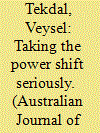

|
|
|
|
|
| Summary/Abstract |
It is widely agreed that recent decades have witnessed a power shift towards the emerging economies. Yet the magnitude of the power shift and its implications for the global economic order are much contested. For some, the diffusion of power has been changing the power relations between the global North and global South as well as within the global South. For others, the emerging economies do not pose a significant challenge to the global North’s dominance in the global political economy as the latter continues to hold structural power advantages in technology, finance, and institutional capacity. This paper contributes to this debate by analysing the changing power relations in the field of development cooperation. As shown by recent work, Chinese development finance, combining a massive scale, global reach, and distinctive modalities, has reshaped the global landscape of development finance. This paper offers an interpretation of this transformation with a focus on power relations. It argues that Chinese development finance has not only decreased the ability of Western development finance institutions to influence policy agendas and preferences in the developing world, but also eroded the latter’s power to shape the governance, norms, and modalities of development cooperation.
|
|
|
|
|
|
|
|
|
|
|
|
|
|
|
|
| 16 |
ID:
165728
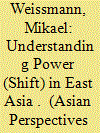

|
|
|
|
|
| Summary/Abstract |
In this article I study the competing US and Chinese narratives about the South China Sea. Arguing that the practice of calculating power shifts in terms of the changing distribution of material capabilities is inadequate, I complement existing literature by taking ideational and normative dimensions of power into account. I ask what the alternative Chinese narrative of power and leadership in the South China Sea looks like and how it is perceived by others in comparison with the dominant US narrative. While a "hard" power transition is ongoing, China's preferred narrative has yet to become widely accepted and the US narrative will remain dominant for now. Nevertheless, China has been making progress in shifting the narrative of what the future could look like with China's vision for a post-US regional and global order now seen as a possible alternative.
|
|
|
|
|
|
|
|
|
|
|
|
|
|
|
|
| 17 |
ID:
103619
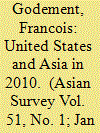

|
|
|
|
|
| Publication |
2011.
|
| Summary/Abstract |
As China asserts itself, neighbors look to the United States for support. The Obama administration is providing it, but faces multiple issues, from Korea to the Afghan situation. U.S. policy toward China is being frustrated on maritime, military, and currency issues. America is balancing engagement, security reassurances, and conflict avoidance.
|
|
|
|
|
|
|
|
|
|
|
|
|
|
|
|
|
|
|
|
|